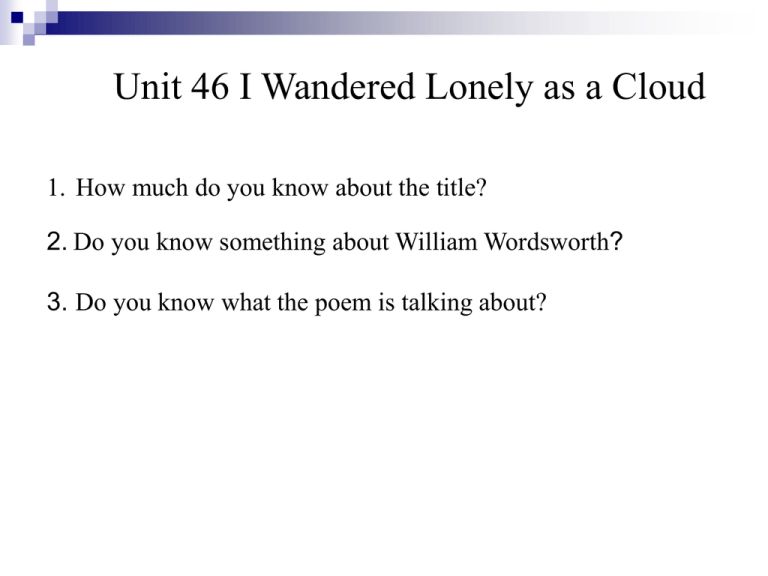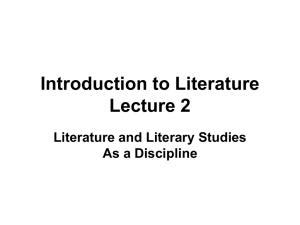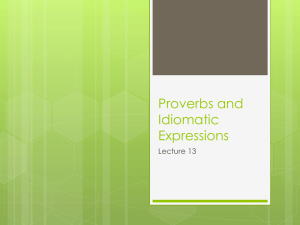综合英语教程4
advertisement

Unit 46 I Wandered Lonely as a Cloud 1. How much do you know about the title? 2. Do you know something about William Wordsworth? 3. Do you know what the poem is talking about? William Wordsworth (7 April 1770 – 23 April 1850) was a major English Romantic poet who, with Samuel Taylor Coleridge, helped to launch the Romantic Age in English literature with the 1798 joint publication Lyrical Ballads. Lyrical Ballads Poems, in Two volumes Guide to the Lakes The Excursion The Prelude He and his sister moved back to England, now to Dove Cottage in Grasmere in the Lake District, and this time with fellow poet Robert Southey nearby. Wordsworth, Coleridge and Southey came to be known as the "Lake Poets". 《我好似一朵流云独自漫游》是华兹华斯抒情的代表作之一, 写于1804年。据说此诗是根据诗人兄妹俩一起外出游玩时深深 地被大自然的妩媚所吸引这一经历写成的,体现了诗人关于诗 歌应描写 “平静中回忆起来的情感”(emotion recollected in tranquility)这一诗学生张。全诗可以分成两大部分;写景和抒 情。诗的开篇以第一人称叙述,格调显得低沉忧郁。诗人一方 面竭力捕捉回忆的渺茫信息,另一方面又觉得独自漂游,可以 自由自在地欣赏大自然所赋予的美景。他把自己比作一朵流云, 随意飘荡,富有想象的诗句暗示诗人有一种排遣孤独、向往自 由的心情。在他的回忆中,水仙花缤纷茂密,如繁星点点在微 风中轻盈飘舞. I wandered lonely as a cloud 我独游于天际,如一朵流云 That floats on high o'er vales and hills, 凌空于谷峰,飘然然悠闲。 When all at once I saw a crowd, 忽地,我看见了一群, A host, of golden daffodils; Beside the lake, beneath the trees, Fluttering and dancing in the breeze. 一簇簇金黄色的水仙; 看在树之荫,湖之缘, 在微风中,她们舞姿翩翩。 Continuous as the stars that shine 她们似银河星钻,连延不断, And twinkle on the milky way, 碧银银,闪闪发光, They stretched in never-ending line 沿着湖湾的水缘线, Along the margin of a bay: 伸向无穷无尽的远方 Ten thousand saw I at a glance, 一瞥去便是一万朵, Tossing their heads in sprightly dance. 轻舞中花首频颠簸。 波光里的涟漪也舞弄清影,却 The waves beside them danced; but they 怎比得水仙的欢快; Out-did the sparkling waves in glee: 伴有这等喜悦, A poet could not but be gay, In such a jocund company: I gazed--and gazed--but little thought What wealth the show to me had brought: 诗人如何不快! 我久久凝视但毫无答复, 可知这景致给予我多少财富: 每当我久卧不眠, For oft, when on my couch I lie In vacant or in pensive mood, They flash upon that inward eye Which is the bliss of solitude; 心绪空荡,或忧思难抱, 她们便闪现在心田, 正如寂寥中的光照; And then my heart with pleasure fills, And dances with the daffodils. 于是我的心儿满溢着欢畅, 同这群水仙起舞歌唱! Skimming and scanning are especially valuable when there is only one item of information that you need to find from a particular passage. • Skimming and scanning are very rapid reading methods in which you glance at a passage to find specific information. These reading methods make it easier for you to grasp large amounts of material, especially when you're previewing. They are also useful when you don't need to know every word. Skimming refers to the process of reading only main ideas within a passage to get an overall impression of the content of a reading selection. An example of this is when we read the title of a newspaper to know what happens everyday. How to skim: 1.Read the title. 2.Read the introduction or the first paragraph. 3.Read the first sentence of every other paragraph. 4.Notice any pictures, charts, or graphs. * Notice any italicized or boldface words or phrases. 5.Read the summary or last paragraph. Scanning is a reading technique to be used when you want to find specific information quickly. In scanning you have a question in your mind and you read a passage only to find the answer, ignoring unrelated information. How to scan: 1. State the specific information you are looking for. 2. Try to anticipate how the answer will appear and what clues you might use to help you locate the answer. For example, if you were looking for a certain date, you would quickly read the paragraph looking only for numbers. 3. Use headings and any other aids that will help you identify which sections might contain the information you are looking for. 4. Selectively read and skip through sections of the passage. This text can be divided into six parts. Part one: 1—3: Where is the Lake District located in the UK? How was the landscape formed in Lake District? Part two: 4: District? What legacy have the early settlers left in the Lake Part three: 5—7: Why does the author say that Wordsworth and potter give the unique charm to the Lakes? How was the famous poem I Wandered Lonely as a Cloud created? Part four: 8—9: What is the topic sentence in this part? Part five: 10—12: Where did the pub get its unusual name? The Splendor of the Lake District paragraphs 1--3 4 5—7 Main idea The Geographical features of the Lake District The Legacy of the early settlers Unique charm honored by the best writers in the country 8—9 Part of the magic of the Lakes is that every valley is different 10—12 The Present Day of Worsworth’s Residence Last para. Conclusion Tucked away: hide Our house is tucked away among the trees. rolling: rising and falling in long slopes 绵延起伏的 Graze: feed on grass Preserve (from): prevent sth from being destroyed; Conserve: keep from being wasted, damaged; Reserve (for): keep for special purpose Set against: consider sth good as balancing or outweighing sth bad 抵消、补偿 Imposing: impressive, grand evoke: call up (feelings) Evocative (of): The taste of the cakes was evocative of my childhood. Given: prep. take sth into account Visitors knock at the front door as a cuckoo clock chimes deep within, and then perch on a deep window seat or beside the fire to peruse Dorothy’s journal entries for that week. Chime: ring, 鸣响,钟声报时 Perch on: rest on Account: report, description. by all accounts: according to (据说) On account of : because of on no account: by no means Take sth into account: 考虑 on sb’s account: for sb’s sake account for: explain on display: 陈列、展览 Stride, stroll, wander, strut, stagger, creep/ crawl, plod, trudge, scramble, roam to: in accordance with 和...一致 go about: to perform or do 着手,从事











